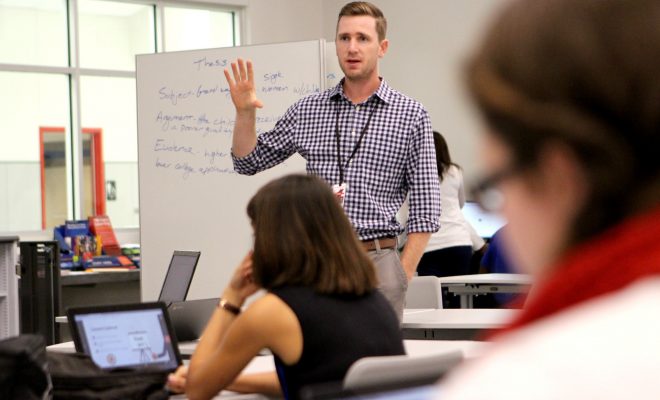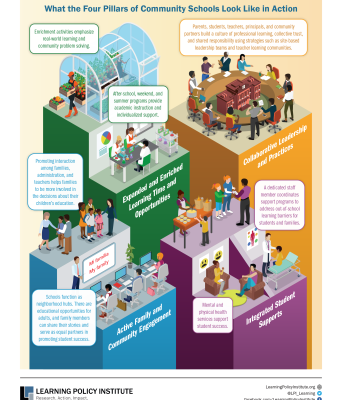Why more K-12 schools should teach the Arabic language

By Kelly Doffing
From improving memory to increasing global understanding, the benefits of learning a foreign language are abundant. As globalization continues and we progress toward a more connected global community, the importance of learning a second language is not only beneficial, but also essential. The U.S. Census reports that only 21 percent of Americans speak a language other than English (at home), yet 75 percent of the world’s population does not have a basic understanding of English.
It is imperative that students be given the opportunity to study a second language in order to ensure that the next generation is equipped to be global citizens who are able to cross geographic and cultural boundaries to solve global problems.
Why we need more Arabic in K-12 classrooms
According to Ethnologue.com, Arabic is the fifth most spoken language in the world and, despite a growing importance of the Middle East in international affairs, there is a shortage of qualified Arabic-language educators in the United States. So, what are schools in the United States doing to further the study and teaching of Arabic?
Qatar Foundation International (QFI) is a U.S.-based not-for-profit dedicated to connecting cultures and advancing global citizenship through education. QFI conducted a survey of school administrators of Arabic-language programs to look at the various challenges, benefits, and logistics of offering Arabic. Between December 2012 and October 2013, the Arabic Language and Culture Program of Qatar Foundation International conducted a phone survey of 201 U.S. K-12 public and public charter schools that teach Arabic. Of the 106 responses, 84 schools self reported that they currently offer Arabic classes.
The survey revealed three key takeaways for current Arabic-language programs as well as for schools considering the implementation of such programs:
- The teacher is critical for the success of the Arabic program. Schools rely on teachers to recruit students to learn Arabic and to conduct outreach events. Schools cited finding a quality teacher and recruiting and retaining students as two of the biggest challenges for offering Arabic. Consequently, twenty-four percent of schools that discontinued their Arabic programs did so because the teacher left or retired. One schools administrator advised, “Getting the correct teacher is the most important aspect [of the Arabic program]; you can do many things like market the program or recruit, but if you don’t have a solid teacher, the program will die.” The field of K-12 Arabic needs more highly trained, certified teachers who are passionate about working with children. Programs such as Teacher Fellowships to fund Arabic teacher study and certification, grants to current teachers for classroom needs and professional development, awards to celebrate excellence, and partnerships with leaders in foreign language education can all serve to increase the number and quality of qualified K-12 Arabic teachers, provide ongoing teacher training to those teachers already in the profession, and support classroom needs and innovation.
- There is an urgent need for high-quality curricula, resources, and materials appropriate for use at the K-12 level. Many current textbooks are intended for university, private, or international students and do not meet national or state standards. Administrators noted that schools offering Arabic are “on the cutting edge,” so teachers have to learn to develop their own curricula. Most teachers develop their curricula by combining material from different textbooks, online resources, other teachers, and their own self-developed materials. The dissemination of standards-based curricula through teacher-to-teacher sharing websites, such as the QFI-supported Al-Masdar, can help Arabic teachers to identify effective student engagement techniques and ensure quality content.
- Getting buy-in from the community and administration is essential. The survey found that 68 percent of Arabic programs are less than five years old. Without local support, Arabic programs cannot get off the ground or become sustainable. Schools that are looking to start programs must first engage with local communities and communicate with parents, encourage students, and gain acceptance from the stakeholders. Schools choose to offer Arabic language for students’ benefit, pointing to the fact that the U.S. government has identified Arabic as a critical language of strategic value. Administrators say that their Arabic programs aim to increase cultural understanding and open up opportunities for students. For these schools, there are resources available – including videos such as “The Benefits of Learning Arabic,” which consists of interviews with multiple administrators, teachers, and students to show how learning Arabic benefits students and the global community.
The survey revealed that the number of Arabic programs has dramatically increased over the past 15 years. School administrators reported that as a result of their Arabic programs, students demonstrated increased global understanding and excitement for the language. Many administrators commented on the opportunities the program opened up for students, the school, and the community. One administrator noted, “It is a feather in our cap to have an Arabic program, especially since we are the only high school in the district to offer the language.” Another remarked that the most rewarding aspect of their Arabic program was, “to see kids who would have not normally pursued something different because… it’s from a different part of the world. Then they explore it and get excited by the language and learn about the similarities and universal truths that they share with Arabs.”
For more information – such as what administrators noted as the most rewarding aspects of Arabic programs and advice from administrators about Arabic-language programs – read QFI’s full report.
___________________
Kelly Doffing is a Program Officer with the Arabic Language and Culture Program at Qatar Foundation International. She holds a Master’s degree in Arabic from the University of Maryland, College Park and completed the Graduate Arabic Flagship Program. She has worked as an Arabic teacher, administrator, and translator in the United States and Egypt. Her interests include expanding opportunities for Arabic learning and improving the quality of Arabic language instruction.



